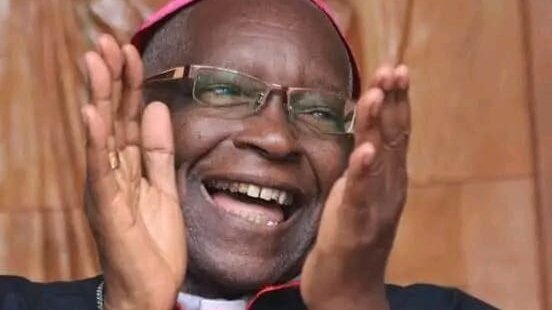For Archbishop Emeritus Peter Kairo, Church is his wife, family

Retired Most Reverend Peter Kairo. Photo/Tybalt Madume
For a man who opted to adopt the Church of Christ as his wife and family, Retired Most Reverend Peter Kairo's life has been that of choosing stilling of biological passions to give rise to an epitome of contentment in pursuing pureness of the soul.
Kairo's life so far is celebrated as that of love for justice, humanity, and peace for family unit and the world in general.
Kairo is also rated as a man whose ultimate thrill has been that of having soldiered all along, denying himself the passions of physiological needs saying--he who willfully stifles bodily desires in the service of God knows no agony of passions.
Kairo says his family is composed of all in the human race who in Christ are bonded together by the unfailing grace and mercies “and you ask me to show you my nuclear family, I will show you the Church of Christ.”
About governance, Emeritus Kairo says “he who serves the human race in governance responsibilities is anointed and justice for all in that service makes God happy.”
It is in pursuit of good governance in a free democracy that Kairo was captured as among the many voices in the Church that dared the President Daniel arap Moi regime to rail at politically instigated clashes in the Rift Valley as well as agitating for the abolishment of one party rule that culminated in a win in 2002 when multiparty was birthed.
In the heat of the struggle, Kairo remembers telling Moi that “ the Church of Christ is bigger than the ruling Kanu party.”
Kairo's journey to the priesthood started on May 24, 1941, when he was born in Londiani village as the first born in a family of nine(9).
Born to a carpenter father--Mr Daniel Muraya and a peasant mother Mama Theresa Wangari--he was to later in life join St Thomas Aquinas Seminary between 1965 and 1970 where he studied Philosophy and Theology.
On November 8, 1970, Kairo was ordained a priest in Molo parish in Nakuru County by the late Archbishop Raphael Simon Ndingi Mwana'a Nzeki then serving in Machakos Diocese.
Kairo then made history for being the first African priest in the larger Nakuru Diocese.
He jetted out of the country in 1972 where he joined St John Fisher's College in New York and in 1974 graduated with a Bachelor's Degree in Religious Studies and Sociology.
He jetted back home and took up the position of the Vocations and Lay Apostolate Director in the Catholic Church.
Between 1976 and 1981 he worked as a lecturer and general spiritual director at where his apostolic journey had started--St Thomas Aquinas.
In 1982 he was appointed the parish priest of Cathedral Parish and the Vicar General of Nakuru Diocese.
It was in 1983 when Pope John Paul II appointed Fr Kairo as the first Bishop of Murang'a to which he was consecrated on May 21, 1983.
He is credited to have grown the diocese from 19 parishes to 29 by the time he left in 1997 and 53 diocesan priests from 19.
He is feted as a spiritual leader who went out of his way to solicit for further studies' scholarships for his junior priests.
He started the Sisters of Emmanuel with four(4) volunteers and which has grown to be home to 50 Catholic Sisters.
He founded Inooro magazine which was published in Gikuyu language and which angled itself as an advocate of democratisation process of the country and abolishment of the monolithic party rule.
The magazine became a tool of encouraging debate about the increasingly then expanding and repressive political environment.
The government of the day took note and in its discomfort, banned the magazine in February 1995.
As the crackdown on non-conformists, a priest and three(3) seminarians were arrested.
Not to be bowed, Kairo launched another publication in 1997 and gave it the name Mwihoko (hope.)
He too is credited to have grown ecumenism and interreligious dialogue and led an asset acquisition drive for Murang'a diocese where it acquired Mboi-Kamiti land which hosts the Beatitudes Christian Formation Centre.
He also was instrumental in the diocese acquiring land in Runda which hosts Elysian Resort. The diocese also has two hospitals and 11 dispensaries as well as homes for the aged in Sagana and Gaturi.
Kairo served in Murang'a for 14 years and in July 1997 he was appointed to succeed his mentor, Ndingi Mwana'a Nzeki.
It is in the senseless politics of conflict in the Rift Valley where he launched a clarion call of Amani (peace) and used it to drive his faithful to the road of reconciliation and promotion of justice when it was unpopular to dare.
Kairo is rated as a spiritual leader who promoted good governance, advocated for human rights and who too laboured for justice and peace.
For his efforts in a political whirlwind, he was attacked twice by sponsored thugs and in the climax of political madness that gripped the country in 2007, his priest--Fr Michael Kamau Ithondeka who was also a lecturer at St Mathias Seminary-Tindinyo, became one of the 1,400 who lost their lives to armed and politically incensed youths.
Kairo was again transferred to Nyeri Diocese where he was installed on June 14, 2008. This was after serving Nakuru for 11 years.
He served Nyeri for nine(9) years and retired in June 2017.
By the time he exited Nyeri's lead spiritual nourisher, he opened 21 new parishes and ordained 70 priests.
He is credited with birthing Radio Maria-Nyeri, Archbishop Kirima memorial hostels and Sacred Heart University in Kiganjo.
He also oversaw the canonisation ceremony of Blessed Sister Irene Stefani Nyaatha--a Consolata Missionnary--an event that caught the global glare.
After his retirement, he adopted Kamakwa village as his retirement home: defining a profile of 54 years to date, of selfless service as a priest.
